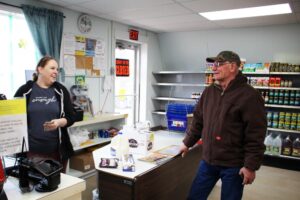For Nebraska Extension’s Cooperative Development Center (NCDC) and Rural Prosperity Nebraska (RPN), the possibilities of the cooperative business model delivered community impact in 2022 and beyond.

Lynch Cooperative Grocery Store in Lynch Nebraska
In the village of Lynch, Nebraska the establishment of a cooperative grocery resulted in the restoration of a quality-of-life amenity for this community of just over 200 residents. After the local grocery store closed in 2020, residents reached out NCDC to explore this shared business model to bring back local food access. With technical assistance from the Center, the cooperative’s steering committee conducted an interest survey, compared business models, and connected with legal and financial resources. This was accompanied by the community’s commitment of volunteerism to remodel and manage the store and find a grocery vendor willing to deliver —all while bringing nearly half the village’s population into cooperative store ownership.
“It takes a village to raise a child, and it takes a community to raise a grocery store,” shared Janie Fisher, Valley Foods Cooperative board member.
Beyond the tangible vibrancy the cooperative restored to Lynch, using Ripple Effect Mapping, community members reported increased networking and connections within the community including among young people and elders, and a reinforcement of their sense of community efficacy— “Lynch can do it!”
Statewide, Lynch’s success has been recognized, as other communities have begun to explore and utilize the cooperative model to not restore or maintain their local grocery stores, but as an opportunity to provide critical services for elders and children through healthcare and childcare cooperatives.
- A Community of Cooperation: Lynch Opens Cooperative Grocery Store: https://ruralprosperityne.unl.edu/community-cooperation-lynch-opens-cooperative-grocery-store
- Accompanying video—A Day in the Life of a Co-op: https://www.youtube.com/watch?v=JQzC56EqMnQ
